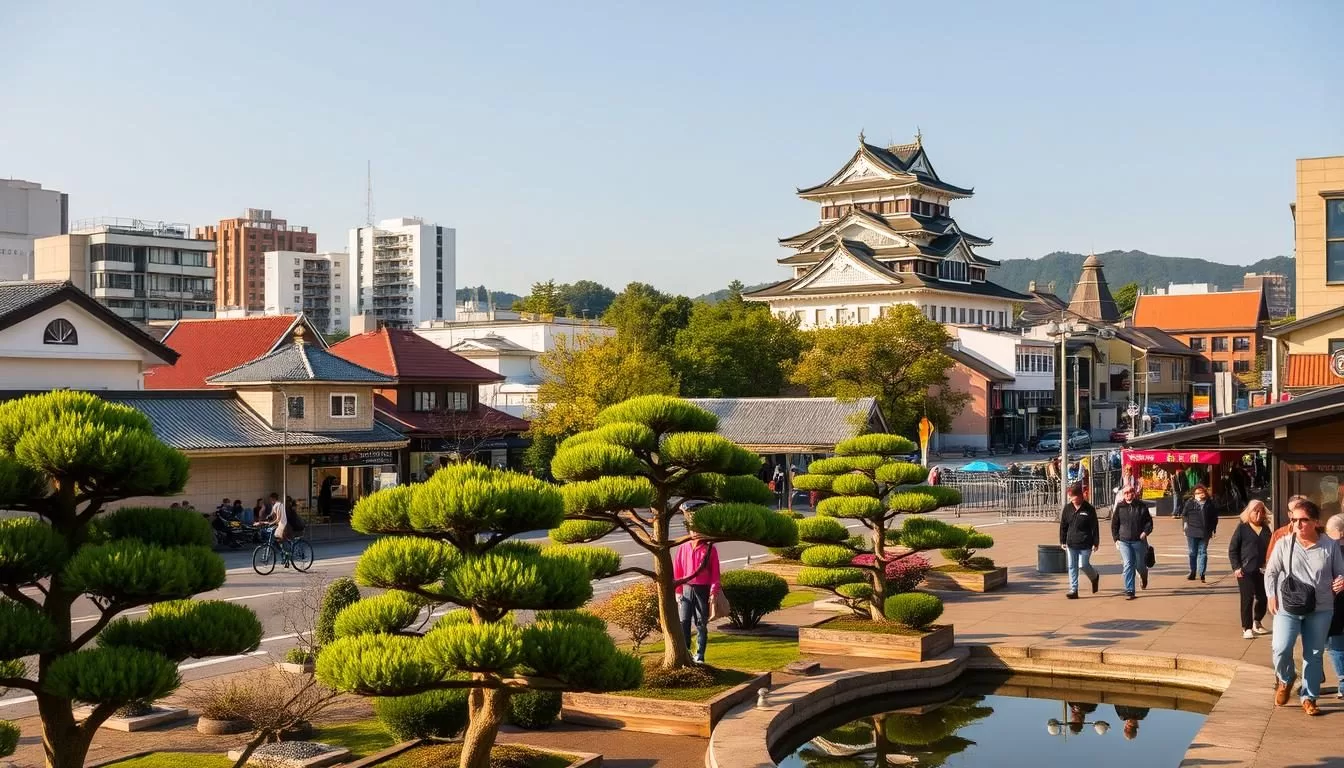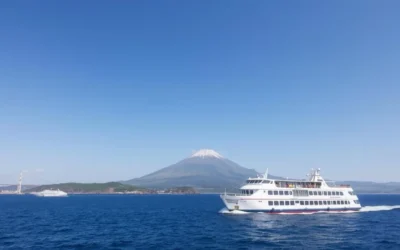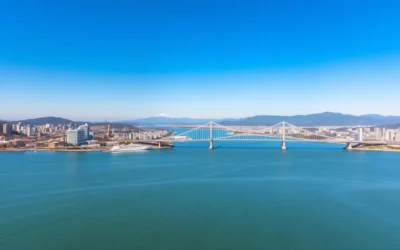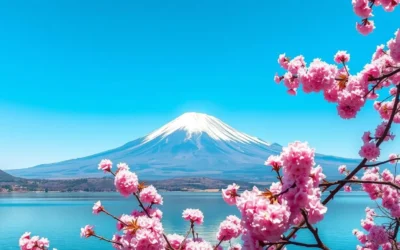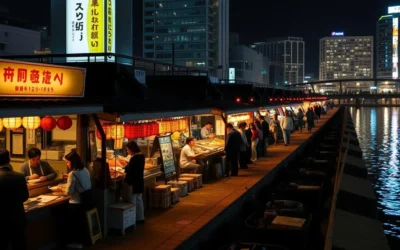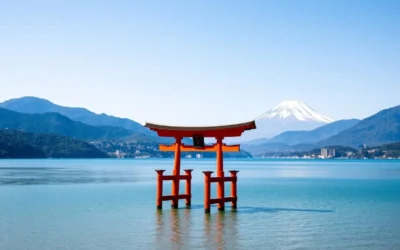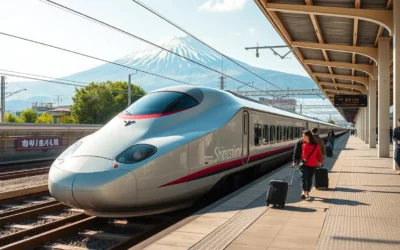✓ Accommodations✓ Flights✓ Rental Cars
Discover the hidden gem of Fukui City, a prefecture in Japan that flies under the radar for many travelers. Located in the north-west corner of Central Japan, Fukui is easily accessible via the Hokuriku Shinkansen service or the Limited Express Thunderbird service, making it an attractive destination for those seeking a unique experience.
You’ll find a perfect blend of history and natural beauty in this charming city. From ancient temples to prehistoric wonders, Fukui City offers a refreshing escape from crowded tourist hotspots. With its convenient transportation connections, you can easily explore the wider Hokuriku region, visiting popular destinations like Kanazawa, Kyoto, and Osaka.
This guide will take you through the top attractions, hidden gems, and practical tips to make the most of your visit to Fukui City.
Discovering Fukui: Japan’s Hidden Gem
Tucked away on Japan’s north coast, Fukui City is a treasure waiting to be discovered. As you explore central Japan, Fukui offers a unique blend of history, culture, and natural beauty that’s off the beaten path.
Location and Accessibility
Fukui City is perfectly positioned between the popular destinations of Kanazawa and Kyoto, making it an ideal stop on your journey. Getting to Fukui is straightforward; the Hokuriku Shinkansen line connects Tokyo to Kanazawa, while the Limited Express Thunderbird provides convenient access from Kyoto and Osaka. From Fukui Station, you can easily reach the city’s main attractions within 30-60 minutes by local buses or trains.
Why Visit Fukui City
Fukui City offers an authentic Japanese experience without the crowds, allowing you to explore at your own pace. The city serves as a gateway to natural wonders, historical sites, and cultural experiences that remain largely undiscovered by international visitors. With its unique blend of ancient temples, prehistoric discoveries, and stunning coastal scenery, Fukui provides a diverse range of experiences that can’t be found elsewhere in Japan. The friendly locals and relaxed atmosphere make Fukui particularly welcoming for visitors looking to experience Japan beyond the typical tourist trail.
In your time in Fukui, you’ll discover a place that is rich in history and natural beauty, making it a great addition to your travel guide.
Eiheiji Temple: A Spiritual Journey
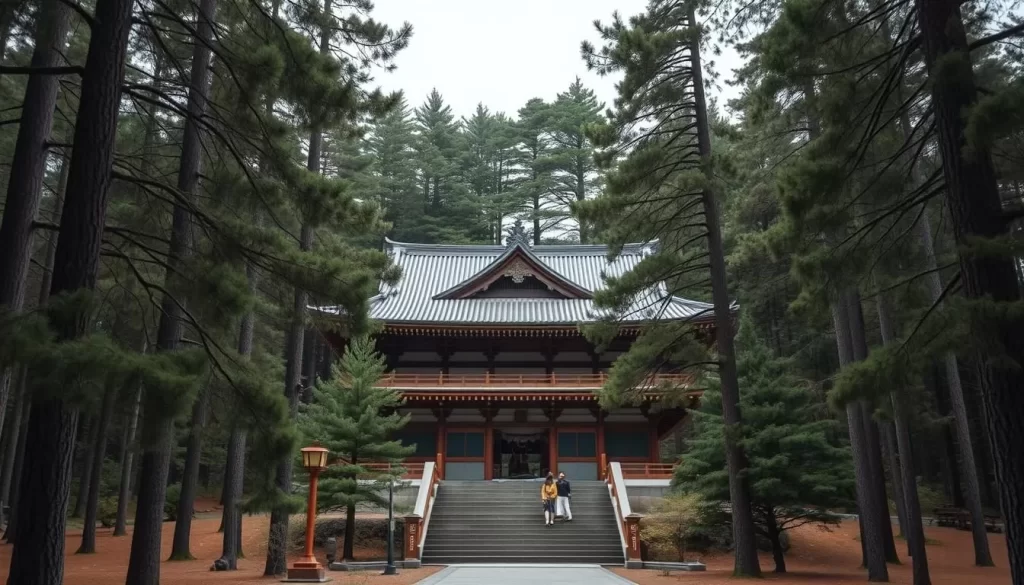
Nestled in a cedar forest, Eiheiji Temple provides a peaceful retreat from the world. As one of Japan’s most significant spiritual centers, it attracts visitors seeking a deeper understanding of Zen Buddhism.
History and Significance
Eiheiji Temple was founded in 1244 by Zen master Dogen, who introduced Soto Zen Buddhism to Japan. The temple complex is comprised of 70 buildings and structures connected by covered walkways, creating a serene atmosphere perfect for contemplation. With a rich history spanning centuries, Eiheiji Temple remains an essential destination for those interested in Zen Buddhism.
Exploring the Temple Complex
Upon entering the temple, visitors receive a brief orientation in the reception hall, with English pamphlets available to facilitate understanding. The complex is home to over 200 monks and nuns who live and train in the rigorous practice of Zen Buddhism. Notable buildings to explore include the impressive Sanmon Gate, the Buddha Hall with its beautiful altar, and the Hatto (Main Lecture Hall) where monks gather for ceremonies.
Zen Meditation Experiences
For those seeking a deeper experience, Eiheiji Temple offers meditation sessions where you can learn the basics of Zen meditation under the guidance of experienced practitioners. The temple is situated in a picturesque area, surrounded by nature that changes dramatically with the seasons, from spring cherry blossoms to autumn foliage, creating a serene mountain atmosphere.
As you explore Eiheiji Temple, you’ll have the opportunity to observe the monks going about their daily routines, offering a rare glimpse into authentic monastic life that has continued largely unchanged for centuries. A visit to Eiheiji Temple is a truly enriching experience that allows you to connect with the principles of Zen Buddhism.
Fukui Prefectural Dinosaur Museum: Prehistoric Wonders
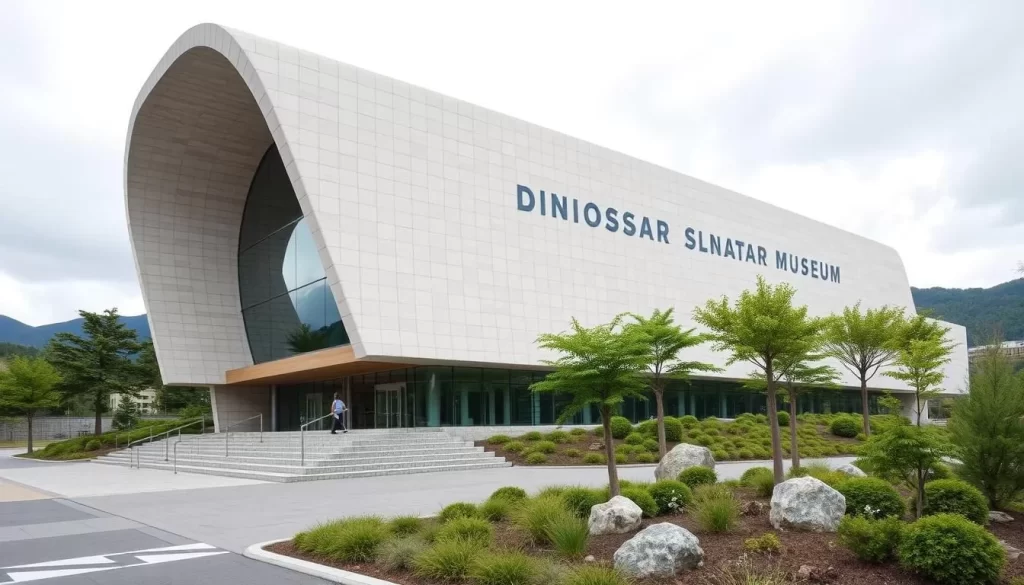
For dinosaur enthusiasts, the Fukui Prefectural Dinosaur Museum is a treasure trove of knowledge and excitement. Regarded as one of the world’s best paleontological museums, it spans four floors and houses an impressive collection of over 40 dinosaur skeletons.
World-Class Exhibits
The museum boasts an extensive array of exhibits, including fantastic reconstructions, animatronics, and interactive displays that bring prehistoric creatures to life. With a good amount of English information available, international visitors can easily navigate and enjoy the exhibits.
The exhibits cover not just dinosaurs but also the history of life on Earth, including the evolution of dinosaurs into birds. This comprehensive approach makes the museum an educational and fun experience for visitors of all ages.
Dinosaur Forest Park
Adjacent to the museum lies the Dinosaur Forest Park, featuring 44 life-sized dinosaur models set in natural surroundings. Some of these models are animatronic, moving as you approach, which adds to the excitement.
Fossil Excavation Tours
For a hands-on experience, visitors can participate in fossil excavation tours available from spring to autumn. These tours offer a unique opportunity to visit actual dig sites and potentially uncover real dinosaur remains.
To fully appreciate the museum’s offerings, it’s recommended to allocate at least 3 to 4 hours. Additional time should be planned if you wish to explore the Dinosaur Forest Park or join a fossil excavation tour.
Historic Sites in Fukui City, Japan: Best Things to Do – Top Picks
Fukui City, a treasure trove of Japan’s rich history, is home to numerous historic sites that are a must-visit for any history enthusiast. As you explore the city, you’ll discover a plethora of landmarks that not only showcase the region’s significant cultural heritage but also provide a glimpse into the lives of Japan’s ruling clans and samurai.
Maruoka Castle
Maruoka Castle, one of Japan’s few remaining original castles, is a must-visit historic site in Fukui City. Constructed in the late 16th century, the castle’s original keep and walls remain today, offering a glimpse into feudal Japan. The surrounding grounds, now a public park, are particularly beautiful during cherry blossom season.
The castle’s misty atmosphere has earned it the nickname “Mist Castle.” Visitors can explore the keep’s wooden interior and strategic design, gaining insight into the lives of Japan’s samurai.
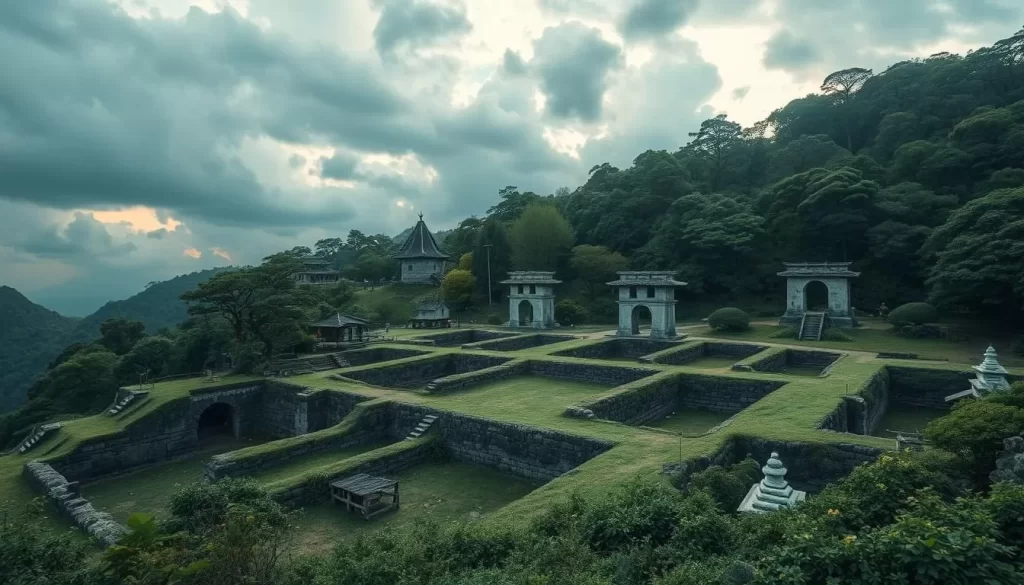
Ichijodani Asakura Clan Ruins
The Ichijodani Asakura Clan Ruins offer a unique glimpse into what was once a thriving cultural and commercial center. The site features excavated areas, reconstructed buildings, and facsimiles of walls and gates, providing insight into the lives of the powerful Asakura clan during the Muromachi Period.
As you explore the ruins, you’ll discover the remains of a thriving castle town that was once home to the Asakura clan. The site’s reconstructed buildings and walls help visualize how this important cultural center functioned over 400 years ago.
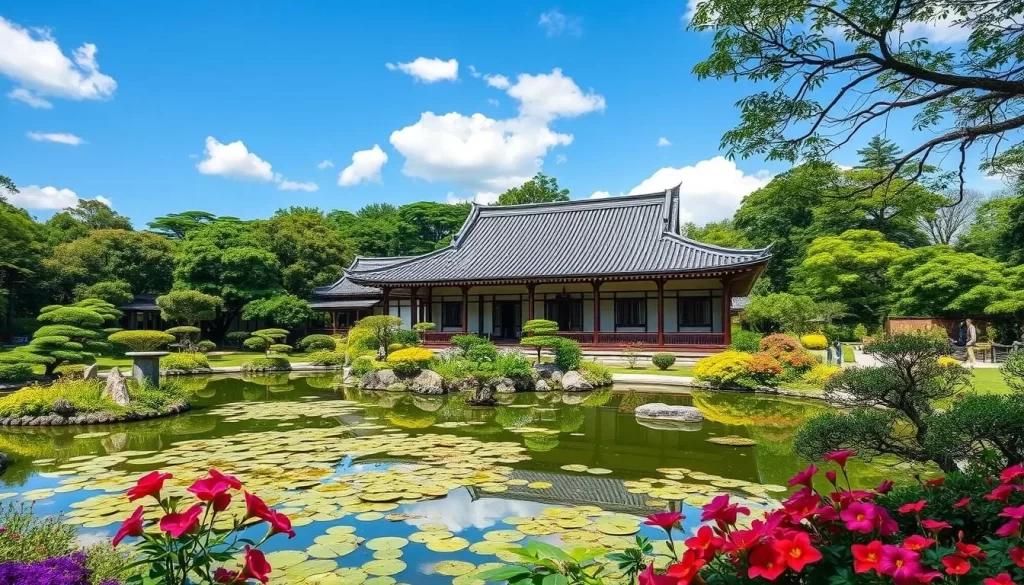
Yokokan Garden
Yokokan Garden, a former residence of the Matsudaira clan, is one of Japan’s most beautiful traditional gardens. The garden features a large pond that surrounds the villa, creating the illusion that it’s floating on water. Visitors can experience traditional tea ceremonies during spring and autumn, adding a cultural dimension to their visit.
The garden is particularly beautiful during autumn, as the changing leaves turn the surrounding landscape red, gold, orange, and brown.
Natural Wonders Around Fukui
Discover the breathtaking natural beauty that surrounds Fukui, a city in Japan that offers more than just history and culture. The area is dotted with unique landscapes that are sure to captivate any traveler.
Tojinbo Cliffs
Located around 25km to the northwest of Fukui City, the Tojinbo Cliffs are a unique and geologically important site along the rugged coast of the Sea of Japan. The cliffs stretch over a 1km stretch of coastline, featuring hexagonal basalt columns that have been eroded by the ocean’s constant movement.
Visitors can enjoy a 30-minute boat cruise to view the cliffs from the water or explore the area on foot. The experience is perhaps best enjoyed on-foot, but be sure to watch your step as there are no guardrails in some sections.
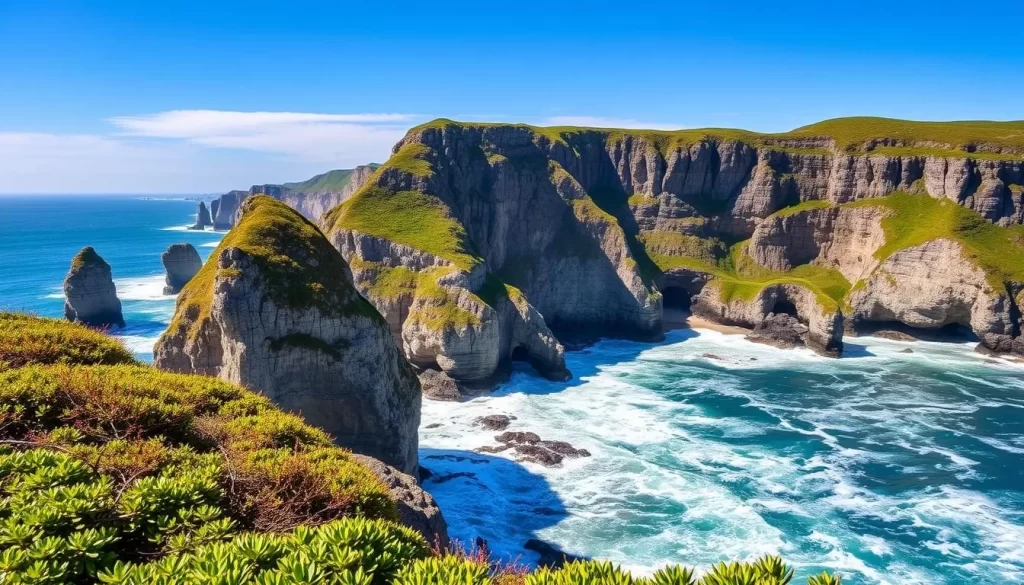
Oshima Island
Just a short distance from the Tojinbo Cliffs lies Oshima Island, connected by a striking red bridge. The island boasts equally impressive cliffs and rock formations, along with a unique forest ecosystem featuring trees typically found in more tropical regions.
As you walk across the bridge onto the island, you can feel the sense of entering a sacred place, thanks to its interesting history and spiritual ambiance.
Mount Asuwa
In contrast to the coastal wonders, Mount Asuwa provides a natural retreat right in the heart of Fukui City, just a 20-minute walk from the main station. At the base of the mountain, you’ll find the Atagozaka Tea Ceremony Museum.
As you ascend the mountain, you’ll discover Asuwa Shrine with its ancient weeping cherry tree, particularly beautiful during the spring blooming season. The mountain area is also home to multiple shrines and temples, the City Museum of Natural History, restaurants, and even a small zoo.
Culinary Delights of Fukui
As you explore Fukui, you’ll discover a world of culinary delights that showcase the region’s best ingredients. The city’s cuisine is deeply rooted in its history and the freshness of the Sea of Japan. With a focus on local specialties, Fukui offers a unique gastronomic experience that reflects its cultural heritage.
Echizen Crab: The King of Winter Food
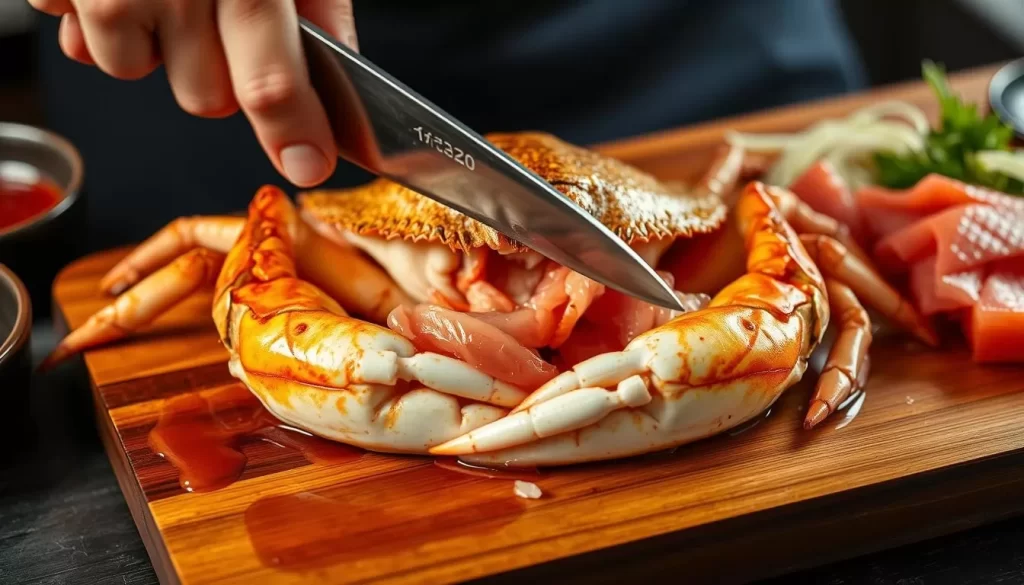
Echizen Crab, also known as Echizen Gani, is a premium seafood delicacy in Fukui, prized for its sweet flavor and tender texture. The crab-fishing industry in Fukui has a rich history spanning hundreds of years, making it one of the oldest in Japan. During the winter fishing season, from November to March, Echizen Crab is best enjoyed in various preparations, including sashimi, grilled, boiled, or shabu-shabu.
Local Specialties Worth Trying
Beyond Echizen Crab, Fukui offers other local specialties worth trying. Saba no Heshiko, a traditional fermented mackerel dish, dates back to the Edo Period. The fish is salted and aged with rice bran for up to a year, resulting in a unique flavor profile. Another must-try is Echizen Oroshi Soba, a refreshing cold buckwheat noodle dish topped with spicy grated radish, green onions, and bonito flakes. These dishes showcase the area‘s culinary expertise and are a testament to Fukui’s gastronomic delights.
When visiting Fukui, be sure to explore the local markets and restaurants in the city center and around Fukui Station, where you can experience the freshest seafood and local cuisine. This culinary journey will provide you with an unforgettable experience of Fukui’s unique flavors and traditions.
Day Trips from Fukui City
With its strategic location, Fukui City offers easy access to some of Japan’s most celebrated destinations. You can take advantage of the efficient train and bus connections to explore nearby attractions.
Kanazawa
Just 45 minutes away by Limited Express train, Kanazawa is a must-visit destination. This charming city is famous for Kenrokuen Garden, one of Japan’s three great gardens, and its well-preserved samurai and geisha districts. You can explore the city’s historic temples and traditional neighborhoods, experiencing the authentic culture of Japan.
Shirakawa-go and Gokayama
For a UNESCO World Heritage experience, head to Shirakawa-go and Gokayama, known for their distinctive “gassho-style” thatched-roof houses. The villages are set against a beautiful backdrop of mountains and rice fields. While the main village of Ogimachi can get crowded, you can escape the tour groups by visiting the smaller villages of Suganuma and Ainokura.
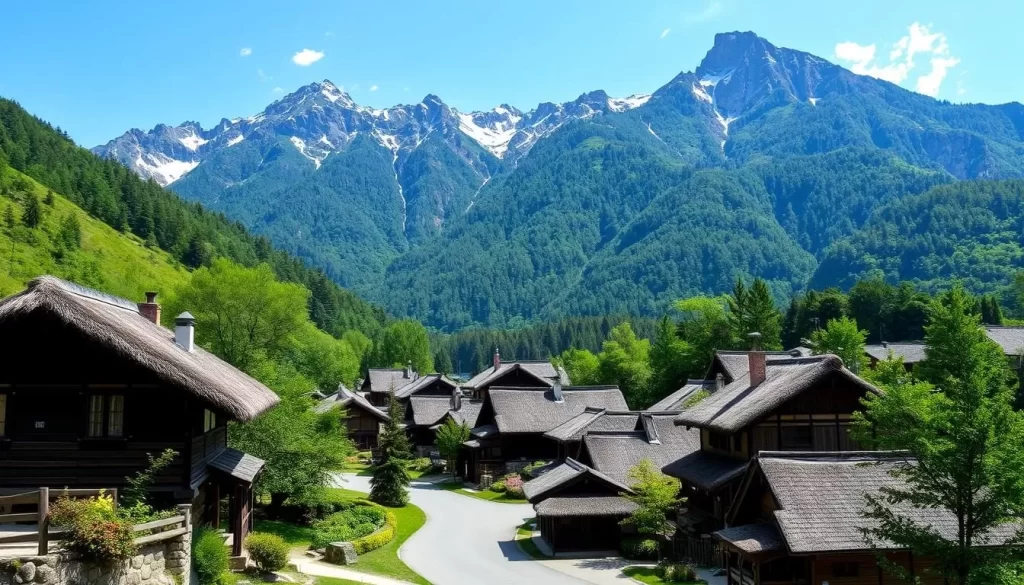
Takayama
The historic town of Takayama is another excellent day trip from Fukui. With its beautifully preserved Edo-period streets and traditional wooden buildings, Takayama is a charming destination. Try to avoid visiting during the middle of the day when large tour buses arrive, and instead, explore the town early in the morning or later in the afternoon.
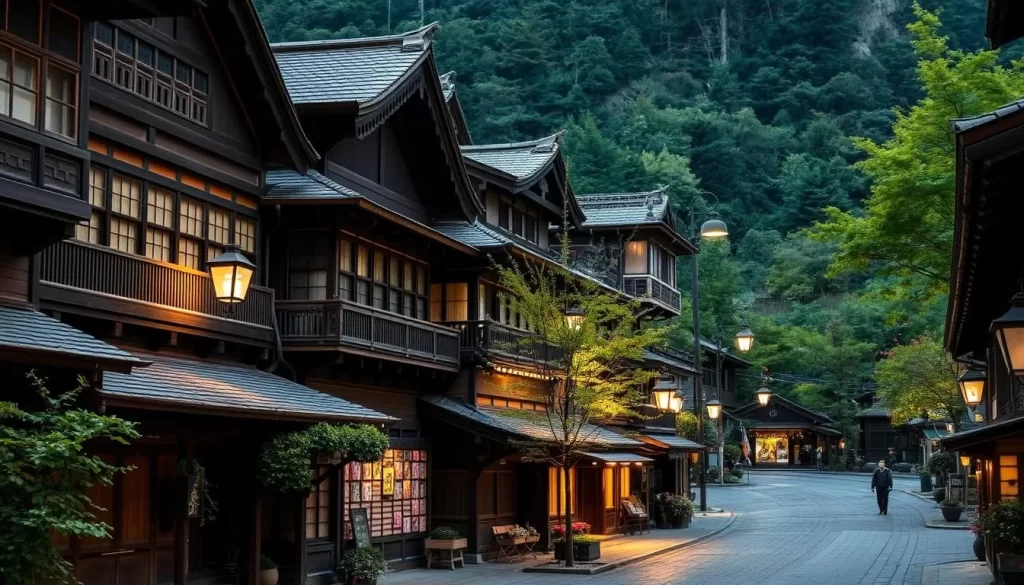
In addition to these destinations, you can also visit Katsuyama City, home to the renowned Fukui Prefectural Dinosaur Museum, or take a guided tour to enhance your understanding of the region’s history and culture. With so many exciting day trip options, you’ll find that Fukui City is the perfect base for your Japanese adventure.
Conclusion
As you reflect on your visit to Fukui City, you’ll discover that this charming town has a way of staying with you long after you’ve left. With its unique blend of spiritual, historical, and natural experiences, Fukui Prefecture offers a travel experience that’s both authentic and unforgettable.
From the serene halls of Eiheiji Temple, where monks have practiced Zen Buddhism for over 700 years, to the impressive Fukui Prefectural Dinosaur Museum, featuring world-class exhibits and fossils, Fukui City caters to diverse interests. The region’s rich history is palpable in sites like Maruoka Castle and the Ichijodani Asakura Clan ruins, allowing visitors to walk in the footsteps of samurai and feudal lords.
Whether you spend a few hours or several days exploring Fukui Prefecture, you’ll leave with a deeper appreciation for this often-overlooked region that perfectly balances traditional and modern Japan. As you plan your visit, remember to savor the experience and absorb the beauty and significance of Fukui City’s temples, museums, and natural sites.
The above is subject to change.
Check back often to TRAVEL.COM for the latest travel tips and deals.
